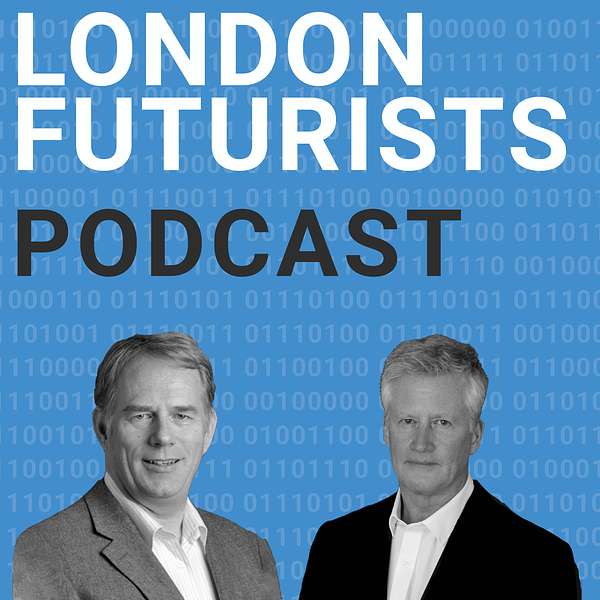
London Futurists
Anticipating and managing exponential impact - hosts David Wood and Calum Chace
Calum Chace is a sought-after keynote speaker and best-selling writer on artificial intelligence. He focuses on the medium- and long-term impact of AI on all of us, our societies and our economies. He advises companies and governments on AI policy.
His non-fiction books on AI are Surviving AI, about superintelligence, and The Economic Singularity, about the future of jobs. Both are now in their third editions.
He also wrote Pandora's Brain and Pandora’s Oracle, a pair of techno-thrillers about the first superintelligence. He is a regular contributor to magazines, newspapers, and radio.
In the last decade, Calum has given over 150 talks in 20 countries on six continents. Videos of his talks, and lots of other materials are available at https://calumchace.com/.
He is co-founder of a think tank focused on the future of jobs, called the Economic Singularity Foundation. The Foundation has published Stories from 2045, a collection of short stories written by its members.
Before becoming a full-time writer and speaker, Calum had a 30-year career in journalism and in business, as a marketer, a strategy consultant and a CEO. He studied philosophy, politics, and economics at Oxford University, which confirmed his suspicion that science fiction is actually philosophy in fancy dress.
David Wood is Chair of London Futurists, and is the author or lead editor of twelve books about the future, including The Singularity Principles, Vital Foresight, The Abolition of Aging, Smartphones and Beyond, and Sustainable Superabundance.
He is also principal of the independent futurist consultancy and publisher Delta Wisdom, executive director of the Longevity Escape Velocity (LEV) Foundation, Foresight Advisor at SingularityNET, and a board director at the IEET (Institute for Ethics and Emerging Technologies). He regularly gives keynote talks around the world on how to prepare for radical disruption. See https://deltawisdom.com/.
As a pioneer of the mobile computing and smartphone industry, he co-founded Symbian in 1998. By 2012, software written by his teams had been included as the operating system on 500 million smartphones.
From 2010 to 2013, he was Technology Planning Lead (CTO) of Accenture Mobility, where he also co-led Accenture’s Mobility Health business initiative.
Has an MA in Mathematics from Cambridge, where he also undertook doctoral research in the Philosophy of Science, and a DSc from the University of Westminster.
London Futurists
Governing the transition to AGI, with Jerome Glenn
Our guest on this episode is someone with excellent connections to the foresight departments of governments around the world. He is Jerome Glenn, Founder and Executive Director of the Millennium Project.
The Millennium Project is a global participatory think tank established in 1996, which now has over 70 nodes around the world. It has the stated purpose to "Improve humanity's prospects for building a better world". The organisation produces regular "State of the Future" reports as well as updates on what it describes as "the 15 Global Challenges". It recently released an acclaimed report on three scenarios for the future of work. One of its new projects is the main topic in this episode, namely scenarios for the global governance of the transition from Artificial Narrow Intelligence (ANI) to Artificial General Intelligence (AGI).
Topics discussed in this episode include:
*) Why many futurists are jealous of Alvin Toffler
*) The benefits of a decentralised, incremental approach to foresight studies
*) Special features of the Millennium Project compared to other think tanks
*) How the Information Revolution differs from the Industrial Revolution
*) What is likely to happen if there is no governance of the transition to AGI
*) Comparisons with regulating the use of cars - and the use of nuclear materials
*) Options for licensing, auditing, and monitoring
*) How the development of a technology may be governed even if it has few visible signs
*) Three options: "Hope", "Control", and "Merge" - but all face problems; in all three cases, getting the initial conditions right could make a huge difference
*) Distinctions between AGI and ASI (Artificial Superintelligence), and whether an ASI could act in defiance of its initial conditions
*) Controlling AGI is likely to be impossible, but controlling the companies that are creating AGI is more credible
*) How actions taken by the EU might influence decisions elsewhere in the world
*) Options for "aligning" AGI as opposed to "controlling" it
*) Complications with the use of advanced AI by organised crime and by rogue states
*) The poor level of understanding of most political advisors about AGI, and their tendency to push discussions back to the issues of ANI
*) Risks of catastrophic social destabilisation if "the mother of all panics" about AGI occurs on top of existing culture wars and political tribalism
*) Past examples of progress with technologies that initially seemed impossible to govern
*) The importance of taking some initial steps forward, rather than being overwhelmed by the scale of the challenge.
Music: Spike Protein, by Koi Discovery, available under CC0 1.0 Public Domain Declaration
Selected follow-up reading:
https://en.wikipedia.org/wiki/Jerome_C._Glenn
https://www.millennium-project.org/
https://www.millennium-project.org/first-steps-for-artificial-general-intelligence-governance-study-have-begun/
The 2020 book "After Shock: The World's Foremost Futurists Reflect on 50 Years of Future Shock - and Look Ahead to the Next 50"
Elevate how you lead with insight from today’s most influential executives.
Listen on: Apple Podcasts Spotify

